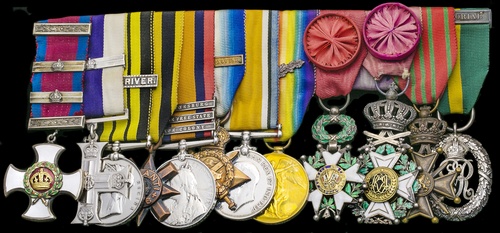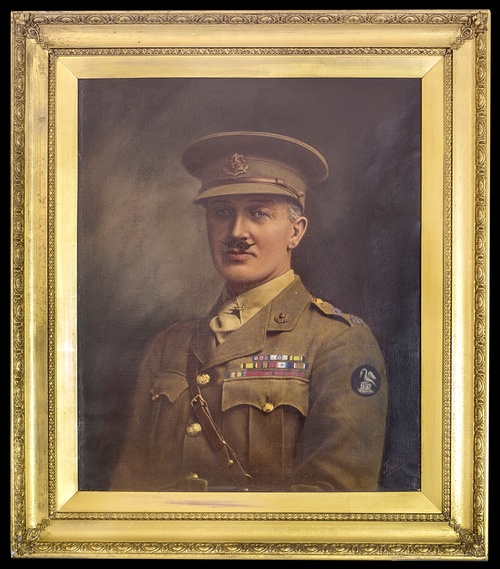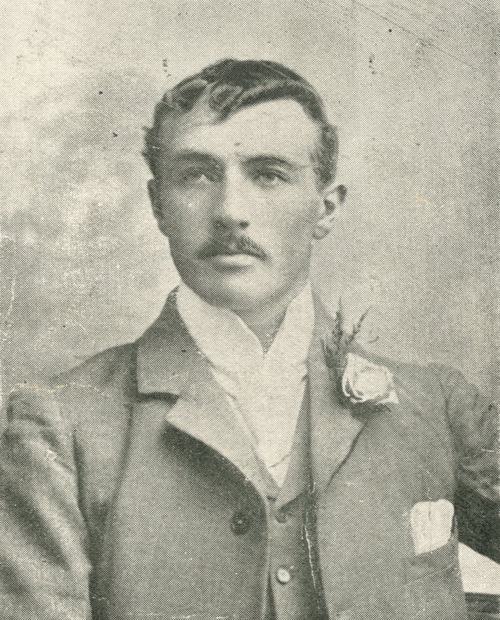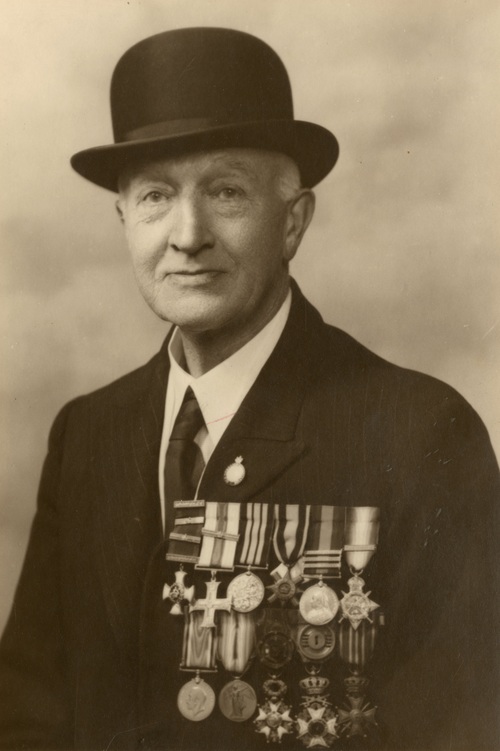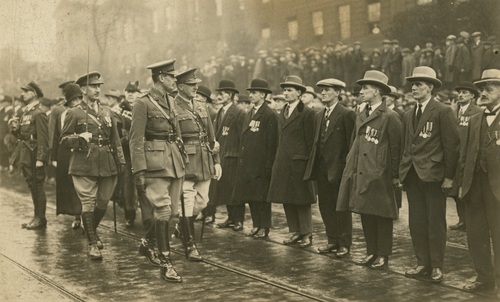Auction: 16003 - Orders, Decorations, Campaign Medals and Militaria
Lot: 6
The Magnificent Great War Battalion Commander's D.S.O. and Two Bars, M.C. and Bar Group of Twelve to Lieutenant Colonel F. Naden, Cheshire Regiment, Who Had Previously Served On The Gold Coast and As A Volunteer During The Boer War, A Confirmed Participant in the '1914 Christmas Truce', Commissioned From The Ranks in 1915, Commanding the 1/6th Battalion Cheshire Regiment, 14th Battalion Hampshire Regiment, 4/5th Battalion Black Watch and 7th Battalion Royal Irish Regiment, Being Decorated No Less Than Five Times
a) Distinguished Service Order, G.V.R., silver-gilt and enamel, with Second and Third Award Bar, with integral top riband bar
b) Military Cross, G.V.R., with Second Award Bar
c) East and West Africa Medal, no clasp [sic], with privately manufactured clasp 'Brass. River' upon riband, (Corpl. F. Naden. R.M.L.I. * H.M.S. Philomel.), renamed and engraved in 'Old English' style
d) Ashanti Star 1896, reverse arms engraved 'Sergt. F. Naden R.M.L.I.'
e) Queen's South Africa 1899-1902, three clasps, Cape Colony, Orange Free State, Johannesburg (7360 Sejt. F. Naden, Vl: Co: Ches: Regt.)
f) 1914 Star, with Bar (1008 C. Sjt. F. Naden. 6/Ches: R.)
g) British War and Victory Medals, M.I.D. Oak Leaves (Lt. Col. F. Naden.)
h) France, Third Republic, Legion of Honour, Officer's breast Badge, 55mm including wreath suspension x 41mm, silver-gilt and enamel, with rosette on riband
i) Belgium, Kingdom, Order of Leopold, Military Division, Officer's breast Badge, 73mm including crown and crossed swords suspension x 40mm, silver-gilt and enamel, French motto, with rosette on riband
j) Belgium, Kingdom, Croix de Guerre, bronze
k) Efficiency Decoration, G.V.R., silver and silver-gilt, with top ´Territorial´ riband bar, mounted in this order, the fifth with left side of carriage sheared, the obverses polished, reverses better throughout, nearly very fine, together with the following archive of related material:
- A finely hand-oil-overpainted large portrait photograph of the recipient wearing his riband bar and the insignia of a Lieutenant Colonel, signed Frisby, Stockport, in a gilt frame
- Nine pictures of the recipient
- The recipient's commissioning document as Second Lieutenant
- The certificates for Second and Third Award Bar to the D.S.O.
- The three Mention in Despatches certificates
- The bestowal document for the Order of Leopold
- The recipient's Certificate of Service confirming his service aboard Philomel- Numerous letters relating to the Great War
- A hand-engraved silver plaque 'Presented to Lt. Col. Frank Naden D.S.O. B. M.C., In honour of the splendid army record of one of Stockports sons during the Great War. By his worship, the Mayor T. Rowbotham J.P. on behalf of his admirers and Follow Tradesmen, Town Hall, Dec. 24th 1917'
- Newspaper cuttings relating to the service, life and funeral of the recipient (Lot)
D.S.O. London Gazette 26.11.1917 Second Lieutenant (Temporary Lieutenant) Frank Naden, M.C., Cheshire Regiment
'For conspicuous gallantry and devotion to duty when in temporary command of his battalion during an action. When the situation was obscure owing to the unit on his left having been held up, he made a thorough reconnaissance at great risk, and obtained valuable information. He then directed the attack of his battalion, capturing all his objectives. Throughout the day and the following days he went about under heavy shell and machine-gun fire, encouraging his men and directing the consolidation. The skilful manner in which he handled a most difficult situation was a great factor in the success achieved.
D.S.O. Second Award Bar London Gazette 16.9.1918 Lieutenant (Acting Major) Frank Naden, D.S.O., M.C., Cheshire Regiment, attached Royal Highlanders
'For conspicuous gallantry and devotion to duty. For three days he successfully kept the enemy out of a village, twice organising counter-attacks after losing, ground under constant and intense bombardments. It was largely owing to his personal gallantry and coolness that the village remained in our hands at the end of the enemy attacks.'
D.S.O. Third Award Bar London Gazette 8.3.1919 Lieutenant (Acting Lieutenant Colonel) Frank Naden, D.S.O., M.C., 1/6th Battalion, Cheshire Regiment, Territorial Force, attached 7th Battalion, Royal Irish Regiment
'Near Neuve Eglise, on 1st September, 1918, he had launched his battalion to attack the village, when he received orders to change direction from south to east. This was done, but the leading companies moved too far to the right. Seeing this, he personally led the right company on to its proper objective in the face of considerable machine gun and trench mortar fire. He was shortly afterwards wounded. But on this and the previous day he showed an absolute disregard of danger, and by his fine example and leadership inspired all ranks.'
M.C. London Gazette 26.1.1917 Second Lieutenant (temporary Lieutenant) Frank Naden, Cheshire Regiment
'For conspicuous gallantry in action. He reorganised two companies and sent them forward to the final objective, thereby clear up the situation at a critical time. He set a splendid example of coolness and courage.
M.C. Second Award Bar London Gazette 26.9.1917 Lieutenant Frank Naden, M.C., Cheshire Regiment
'For conspicuous gallantry and devotion to duty on several occasions during the operations. He went among the men, cheering them up, assisted wounded, organised and took forward parties under heavy fire, regardless of danger to himself, and at all times was ready to render assistance in any way. He afterwards took over command of the battalion and brought them out. His conduct was magnificent throughout.
M.I.D. London Gazette 18.12.1917 Lieutenant F. Naden, Cheshire Regiment
M.I.D. London Gazette 27.12.1918 Acting Lieutenant Colonel F. Naden, Cheshire Regiment
M.I.D. London Gazette 8.7.1919 Temporary Lieutenant Colonel F. Naden, Cheshire Regiment
Belgium, Order of Leopold, Officer London Gazette 24.10.1919 Lieutenant (temporary Lieutenant-Colonel)
Frank Naden, D.S.O., M.C., Cheshire Regiment (Territorial Force) attached Royal Irish Regiment
'For distinguished services rendered during the course of the campaign.'
The original recommendation states: 'Near Neuve Eglise on the 1st September this Officer has launched his Battalion to attack the village when he received orders to change direction from south to east. This was done, but the leading Companies moved too far to the right. Seeing this, Lt. Col. Naden personally led the right Company on to its proper objective in the face of considerable machine gun and trench mortar fire. He was shortly afterwards wounded. Both on this and the previous day he showed and absolute disregard of danger and by his fine example and leadership inspired all ranks. [Continued in pencil] He has shown the same qualities during his four years' service in France and Belgium.'
Belgium, Croix de Guerre London Gazette 24.10.1919 Lieutenant (temporary Lieutenant-Colonel) Frank Naden, D.S.O., M.C., Cheshire Regiment (Territorial Force) attached Royal Irish Regiment
'For distinguished services rendered during the course of the campaign.'
Lieutenant Colonel Frank Naden, (1875-1954), was born at Hartington, Buxton, Derbyshire, the son of Alfred Naden of Stockport. He initially enlisted in the Royal Marine Light Infantry as Private, 4.7.1893, promoted Corporal, 22.3.1894, serving in H.M.S. Philomel, 25.10.1894-31.12.1896 during the campaign along the Gold Coast. Intriguingly, the service papers for this period note 'RUN' for 1.1.1897-3.1.1897, the last entry for his service in the Royal Marine Light Infantry.
With the commencement of hostilities in South Africa, Naden enlisted in the 4th Volunteer Battalion, Cheshire Regiment, 17.1.1900. Interestingly, the answer in the service papers as to whether the individual had served previously, the answer reads 'Yes; Royal Marines, Purchase'. He served as 7360 Sergeant with the Regiment in South Africa, 16.2.1900-28.4.1901, with the award of a three-clasp medal confirmed upon the roll. Naden and his exploits in the Cape were reported by the Stockport Advertiser, with a most interesting letter dated 17.5.1900, from Kroonstad:
'Dear Sir, Again I take the opportunity whilst enjoying a well-earned rest to write a few lines concerning we Cheshire Volunteers. We have had a very had and trying time lately, very heavy marching, short rations and a scarcity of good water. I am sorry to say that it has proved too much for some of the members of the Company, whom we have had to leave behind, where they, as soon as convalescent, are to do duty as hospital orderlies. They will have a very nice time of it, far better than their comrades who have "stuck it," for they have good food etc. and very light duties. However we chaps do not envy them, but on the contrary we feel sorry for them, insomuch as they having gone so far through the campaign will not be in at the death, and take part in the triumphal march into the now notorious "Pretoria". Our Company is now above 80 strong out of our 116.
The last time I wrote to you think was whilst on outpost duty, and after a skirmish on the kopjes around Bradfort. You will see now that we are at Kroonstad. We have marched on an average 20 miles per day, one day in particular being very tiring, we being on our feet for 21 hours out of the 24, and covering 28 or 29 miles. That was the day before the Battle of the Zand River, where we entirely broke the Boer's hearts. We were all very proud that day, for we formed part of the firing line and advanced across a wide and open plain right up to the Boer position, which was on a line adjacent kopjes to our front, through a very heavy shell fire. I am glad to say none of us were hit, though many experienced some very narrow escapes, and it is next to miraculous that none were killed. I will quote one instance.
Whilst our artillery were searching the enemy's position, some of our artillery were told off for duty on observation post and some as reconnoitring patrols. It is of the latter that I am speaking. Their duty was to patrol about and keep their eyes open for any of the enemy's scouts that might be lurking about, and especially to search a large nulla or raving that lay to our right. By the nulla was situated a Boer farm evidently deserted except for an old cat that could be seen running about, and a good yard full of livestock, poultry, pigs, etc. Such an opportunity for a bit of loot and a good stew of poultry was not to be missed and one or two took advantage of it. Having been through the house a raid was made on the poultry, and whilst chasing the fowl, a Boer shell came straight between two of our men whilst standing at not above a yard apart, and buried itself in the ground three feet away, entirely wrecking the hen pen and scattering the fowl in all direction. They did not wait to catch the poultry, for having found the range, the enemy planted shell after shell in and around that house evidently thinking it was affording good cover for our infantry. Several thus equally startling experiences, I could mention, but I will not now encroach on your time and my own, which is limited.
It was a hard fight lasting six hours. We drove the Boers from kopje to kopje and finally drove them all out together. It was a treat to see them, thousands galloping way as if each was competing in a steeplechase. If we have only had some cavalry with us we could have cut them to pieces. We formed up under the last kopje about 3 o'clock in the afternoon and rested until four next morning, when we started off again. We expected a great deal of opposition here- a great battle- but what was our surprise, while after such to be able to walk straight into the town and find it evacuated, in fact already occupied by some of our cavalry...This is no mistake this is a terribly hard campaign, and one and all will be well pleased when it is all over. I have great hopes of being with you for August Bank Holiday, that is if the means of transport are adequate, such as they were in bringing us out. We are at a loss for news. There are rumours galore, but we seldom get anything authoritatively. Peace has been declared a dozen times over. Steyn capitulated, Kruger dead and a hundred and one other things. Anyhow, we shall now I hope soon have the pleasure of seeing the matter settled for ourselves, and have the chance of shouting three cheers, and another three at seeing the Union Jack flying over the Presidency at Pretoria.
I have no more to write about now but will drop you a line at our next stop, so until then adieu and best of luck- I remain yours truly, Sergeant F Naden.'
The Macclesfield Advertiser reported active service for the 4th Battalion being stationed at Johannesburg Fort, 27.7.1900, stating in fact that '...It will be of interest to Stockport Volunteers to learn that Sgt. Nadin [sic] who went out with the active service Company has been appointed Sgt. Maj. of the Mounted Section of the Johannesburg Police. Sgt. Nadin [sic] was a member of the Cape Mounted Police at the time of the Jamieson Raid.'
Naden remained in the Cape for a total of 1 year 104 days, being discharged with a gratuity of £10, 30.4.1901.
Remaining a member of the Volunteers, whilst serving as a Constable in the Staylebridge Force, Naden was mobilised for duty during the Great War, serving on the Western Front initially as Colour Sergeant in France from 10.11.1914. His name is in fact mentioned twice in the excellent book Christmas Truce: The Western Front, 1914, by Brown and Seaton, in which Naden is quoted upon the exchange of prize souvenirs made in no-man's land during the Truce of 25.12.1914, '...They greatly admired our equipment, and especially wanted us to give them our jack-knives.' The publication also quotes his letter, '...We had a rare old jolification, which included football, in which the Germans took part.'
Such is the recent fame of the football match played by the 6th Battalion Cheshire's at Wulverghem, that many of the readers of this catalogue will remember a recent poignant television advert in which the game is featured. Naden's extract in Christmas Truce: The Western Front, 1914, is actually taken from an article published in The Newcastle Evening Mail and is quoted in full below:
'On Christmas Day one of the Germans came out of the trenches and held his hands up. Our fellows immediately got out of theirs, and we met in the middle, and for the rest of the day we fraternised, exchanging food, cigarettes and souvenirs. The Germans gave us some of their sausages, and we gave them some of our stuff. The Scotsmen started the bagpipes and we had a rare old jollification, which included football in which the Germans took part. The Germans expressed themselves as being tired of the war and wished it was over. They greatly admired our equipment and wanted to exchange jack knives and other articles. Next day we got an order that all communication and friendly intercourse with the enemy must cease but we did not fire at all that day, and the Germans did not fire at us.'
Following the festivities, usual service and combat resumed. Naden was quickly promoted Quarter Master, being commissioned Second Lieutenant, 6th Battalion Cheshire Regiment, 21.2.1915, he was then wounded, 29.4.1916 and made Adjutant, 4.7.1916. Awarded the M.C. for action at Beaumont Hamel, awarded a Second Award Bar to the M.C. for action at St. Julien upon the same day in which he was appointed Commander, 1/6th Battalion Cheshire Regiment, 31.7.1917. The War Diary of July of 31.7.1917 states:
'The assembly of the Battalion was completed by 0130am. At zero plus 1hr 40min Battalion moved forward to the attack, reaching objective at 1115am. At 1215pm owing to flank units being unable to attain their objectives, and thus causing considerable casualties to my unit, it was necessary to withdraw to join up with the units consolidating in rear. The consolidation was completed and the new line held despite severe hostile fire.
Casualties- 3 Officers killed, 500 (approx.) killed, wounded or missing.'
This was a day in which 'The 1/6 Cheshire, after crossing the Zonnebreke-Langemarck road, came under heavy machine-gun fire for the right rear, owing to the delay of the 165th Brigade. Despite heavy losses, it pressed on to the German Third Line west of Aviatik Farm, at the extremity of Gravenstafel spur, where a large number of Germans behind a mass of uncut wire were holding up their hands in surrender...right of the Brigade, the 1/6 Cheshire on the extremity of the Gravenstafel spur, was thereby exposed, and swung back its left flank. A number of prisoners who had previously held up thier hands in surrender took advantage of this movement to pick up there rifles again and open fire. Any aggressive action on their part, however was promptly averted owing to the intensity of the German barrage, falling at this moment on friend and foe alike along the German Third Line; the Germans took shelter from it, while the Cheshire, losing heavily, withdrew gradually towards St. Julien and Border House.' [Military Operations: France and Belgium, 1917, refers]
Naden was awarded his first D.S.O. for action at the Menin Road, 20.9.1917, a letter dated 2.10.1917 from Brigadier General Armitage elaborates on the action:
'Dear Bellingham, Will you please convey my thanks to Capt. Naden and the 1/6th Cheshire for the gallant part they played in the attack on Sept. 20th. I had hoped that it would not be necessary to call on them but owing to the Brigade on my left not getting their objectives I had to use them to protect my left flank and eventually to attack the Green line. I kept Capt. Naden at my Hq Qtrs to start with and when it appeared likely that I might have to make a local counter attack to clear up the situation on my left, I sent him up to make a report and reconnoitre the best way up. He did this to my entire satisfaction and sent back valuable information. He showed great coolness and gallantry in a difficult position and set a fine example to all near him. I am afraid the Company that attacked the Green line had a good many casualties owing to machine gun fire from their left. They all behaved magnificently.'
Naden then commanded the 14th Battalion Hampshire Regiment from 29.9.1917-31.1.1918 and the 4/5th Battalion Black Watch from March 1918. He was severely wounded whilst Commanding 118 Brigade Composite Battalion at Kemel, 29.4.1918, also earning a Second Award Bar to the D.S.O.. Following a full recovery from wounds sustained, Naden Commanded the 7th Battalion Royal Irish Regiment from 27.7.1918, a letter from Major General Williams dated 20.9.1918 gives a rousing report of one engagement:
'I wish to congratulate Lt. Col. Naden D.S.O., M.C., Captain Stanton, 2.Lt. Trueman and No.9 Platoon of the Royal Irish Regt. The bold patrolling by the Platoon on the night of the 18/19th reflects great credit on all concerned. It shows a fine soldierly spirit in the Battalion and good training. The Battn. have also done good work whilst in the line. It is just this good training and soldierly spirit which is beating the BOCHE.'
Naden was awarded a Third Award Bar to the D.S.O. for action at Wervicq, October 1918.
Alongside this tally of five gallantry awards, he was not absent from his Battalion, except for the seven weeks in recovery, during 4 years and 3 months of service on the Western Front, having gone 'over the top' over 25 times, being Mentioned in the Despatches thrice in this time also.
Following the Great War, Naden remained in service as the first Lieutenant Colonel of the 60th (6th Cheshire and Shropshire) Regiment, no doubt with assistance of an original letter of recommendation showering praise from Brigadier General Goodman, dated 5.5.1919 states '...There is one other Officer whom I must mention, that is Lieut (T/Lieut-Col) F. Naden., D.S.O., M.C. He came out to France with the Battalion in November 1914 as a Company Sergeant Major and with the exception of a short period in 1918 when he was wounded, has served in this country continuously. He soon gained a commission and acted as Quartermaster, Adjutant, and Second in Command, and has also commanded the Battalion. His capacity to command, and personal gallantry have been marked. He has a various time commanded the 14th Bn. Hampshire Regiment and the 4/5th Black Watch in the 39th Division, and since 11th August 1918 the 7th Bn. Royal Irish Regt. in this Brigade. Lieut-Col Naden has been awarded the D.S.O. with two bars, the M.C., with one bar, the Order of Leopold and the Belgian Croix de Guerre. In conclusion I may add that I consider the 6th Bn. Cheshire Regt to be one of the best Battalions I have had under my command during the war.'
He continues '...another Naden is a volunteer for the Army of Occupation and I do not know when he may return to Stockport but in view of the reconstitution of the Territorial Army Force, I feel bound to say that in my opinion, his claims to the command of the 6th Bn. Cheshire Regt. far outweigh those of any present Field Officer or Captain of the Battalion. He is a Commanding Officer of quite exceptional ability and but for the Armistice would have been recommended for a Brigade Command.'
His last entry in the Army List being during 1923. Naden and Colonel F. Rivett were the only two surviving Officers of those who served with the 4th Battalion Cheshire Volunteers during the Great War and the Regiment during the Great War. It would appear he suffered a rather severe and debilitating injury, as dated 20.5.1925, Naden was paid a £200 gratuity following '...80% injuries, right and left legs, fracture base of skull and deafness.'
Naden later served as a Fruiterer, acted as President of the Stockport Old Comrades Association and died at Stockport, 9.9.1954, aged 76. His service was held at St. George's Church, Stockport and the man once hailed 'Stockport's Bravest' received a Guard of Honour from friends and old comrades before committal at the Stockport Crematorium.
Subject to 20% VAT on Buyer’s Premium. For more information please view Terms and Conditions for Buyers.
Sold for
£15,500

